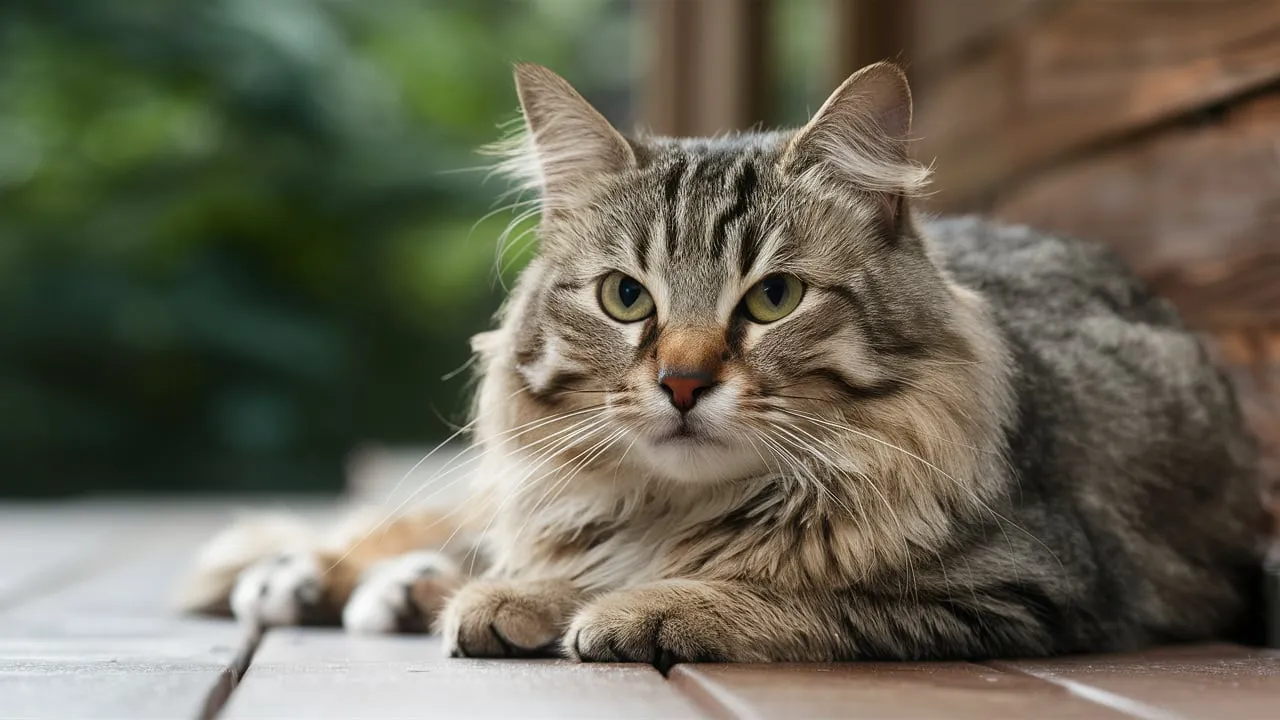Does your feline friend seem to be snoozing more than usual? While cats are renowned champions of napping, averaging over 12 hours of shut-eye a day and reaching a whopping 80% sleep time for seniors, there comes a point where excessive slumber might raise a red flag. Distinguishing between a well-rested cat and a lethargic one can be tricky. If you’ve been wondering “Is my cat lethargic?”, you’ve come to the right place! This article will delve into the world of feline lethargy, exploring the potential causes and the best course of action to ensure your furry friend’s health and well-being.
What Is Lethargy In Cats?
Lethargy in cats goes beyond just catching some extra Zzz’s. It’s a marked decline in their usual energy levels, characterized by a significant reduction in activity. While a tired cat might perk up after a few hours and resume its playful antics, a lethargic cat will remain subdued even after enjoying a seemingly restful nap. This persistent lack of activity can manifest in other concerning ways, like a decreased appetite, vomiting, and even weight loss due to their diminished energy expenditure. The key to identifying lethargy lies in observing your cat’s baseline behavior. By comparing their usual activity level and sleep patterns to their current state, you can determine if there has been an abnormal dip in energy, prompting a visit to your veterinarian to explore the underlying cause.
Causes Of Lethargy In Cats
While a short period of lethargy after vaccinations or during general illness is understandable, a persistently lethargic cat warrants a closer look. Pain, whether from injuries that hinder movement, chronic conditions like arthritis, or even kidney disease, can significantly sap your feline friend’s energy. Weight issues, both overweight and underweight, can also contribute to lethargy. Several underlying medical conditions can be culprits as well, including digestive problems, liver or kidney disease, diabetes, and various infections. Medications, even those specifically designed for cats like tramadol or certain antibiotics, can have lethargy as a side effect. Diet plays a crucial role too – deficiencies or imbalances in essential nutrients can lead to lethargy. As your cat ages, their body naturally slows down, and conditions like arthritis can further contribute to decreased activity levels. Neurological disorders are another potential cause of lethargy in cats. If you notice any persistent changes in your cat’s energy levels, it’s vital to consult your veterinarian to identify the root cause and ensure your furry companion receives the proper treatment.
Home Remedies For Lethargic Cat

While lethargy often indicates an underlying medical condition that requires veterinary attention, there are some home remedies that can be helpful in managing symptoms and boosting energy levels after your cat receives a proper diagnosis and treatment plan. These methods should always be implemented under the guidance of your veterinarian to ensure your pet’s safety. Natural supplements like catnip (in small doses!), B vitamins, turmeric, milk thistle, and coenzyme Q10 may offer a gentle energy boost. Aromatherapy with pet-safe essential oils like peppermint, ginger, rosemary, or lemon oil can create a stimulating environment. Removing any potential toxins from your home that might be harming your cat’s health is also crucial. Finally, incorporating playtime and gentle exercise routines into your cat’s daily schedule can encourage activity and improve their overall well-being. Remember, these remedies are meant to complement veterinary treatment, not replace it. If your cat’s lethargy persists after trying these methods, consult your veterinarian immediately to discuss further diagnostics or in-home care options.
Signs & Symptoms Of Lethargy In Cats
Spotting lethargy in your cat goes beyond just a few extra naps. It’s a state of persistent tiredness accompanied by other concerning signs. Watch out for a loss of interest in activities your cat once loved, like playtime or chasing toys. They might also exhibit a delayed or absent response to external stimuli, like your voice or a favorite treat. A marked decrease in their usual activity levels and a general lack of energy are clear indicators of something amiss. Additionally, lethargic cats might neglect their grooming routines, appearing unkempt. While senior cats naturally slow down, any sudden onset of lethargy warrants a visit to your veterinarian. Early detection and diagnosis are key to addressing the underlying cause and restoring your feline friend’s energy and zest for life.
When To Seek Veterinary Care
Don’t wait until your feline friend becomes completely inactive! If your previously energetic cat has displayed a noticeable drop in activity for more than two days, initiate a virtual consultation with BetterVet. This is especially crucial if lethargy is accompanied by other worrying symptoms like drooling, jaundice (yellowing of the eyes or gums), a significant decline in appetite, persistent vomiting, unexplained weight loss or gain, difficulty breathing, or any behavioral changes. These additional signs might point to a more serious underlying health issue. Remember, lethargy and many of its accompanying symptoms can manifest in various feline illnesses. Therefore, providing your veterinarian with a detailed account of all your cat’s symptoms is vital for an accurate diagnosis and effective treatment plan. Don’t hesitate to seek veterinary attention – early intervention can make all the difference in your cat’s recovery and well-being.
Conclusion
We hope with information of Infor Cats you can understanding about home remedies for lethargic cat. Lethargy in cats can be caused by a variety of factors, some of which are serious and require veterinary attention. However, there are also a number of home remedies that you can try to help boost your cat’s energy levels and improve their overall well-being. If you are concerned about your cat’s lethargy, it is always best to err on the side of caution and consult with your veterinarian. They can help you determine the underlying cause of your cat’s lethargy and recommend the best course of treatment.

Related Post
When To Euthanize A Cat With Liver Failure?
Cat Got Out What To Do?
Can Fixed Cats Go Into Heat? The Science Behind Spaying And Neutering